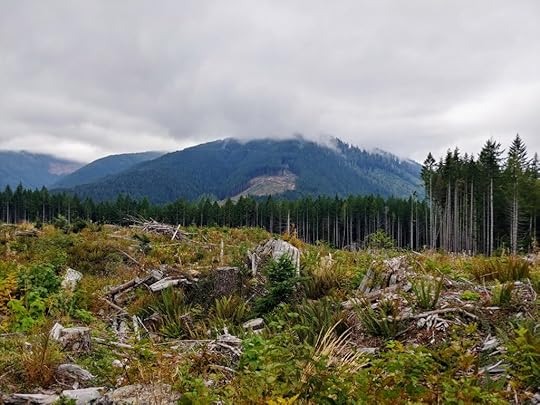Avery’s Legacy

An as of yet unpublished story inspired by my late uncle, whose implausible vision of seeding clearcuts was… perhaps not as crazy as it sounded.
Uncle Avery was considered the family nutjob. The family tolerated his eccentricities, given his service record, but I could tell they secretly thought of him as just another crazy old pothead veteran and only listened half-heartedly to him. I found his stories entertaining. Avery was great company beside a campfire. Many a night I sat, riveted by his often graphic accounts of his many brushes with death during his time as a military pilot in the Middle East. As time passed, Avery’s tales veered away from war stories toward current events, which morphed into apocalyptic and inevitably to conspiracy theories.
He was convinced that “The Big One” was coming any day. He claimed to have seen all the signs: flocks of birds; unusual clouds; numbers in the subway that matched the birthdates of members of our family; all indications (to him) that a major earthquake was imminent. When The Big One hit, he said, the West coast would be wiped out, the interior of North America would become waterfront, and Vancouver Island (where I lived) would sink into the ocean. My attempts to explain to him that the island was in fact a mountain, securely anchored to the ocean floor, fell on deaf ears. Uncle Avery would just shake his head, light up another joint and tsk-tsk in pity at my ignorance of the facts as he saw them.
Y2K had Avery practically salivating. He spent the better part of the nineties warning anyone who would listen of the chaos to come. The banks would go broke and everyone’s money would disappear, he said. Anyone with any sense should withdraw all their funds from banks and carry cash, or better yet, buy gold, because even that cash would soon be worthless and society would revert back to the old ways. All electronics would malfunction; Stephen King’s Maximum Overdrive wasn’t fiction, but a warning of things to come. Cars would no longer run, except to run down every human in their path. Even seemingly benign items like toasters would suddenly achieve sentience and attack their owners. As much as I enjoyed ol’ Avery’s tales, even I drew the line at killer toasters. He seemed almost disappointed when the world didn’t end on January 1, 2000.
I was glad, in a way, that he didn’t live to see the post-millenium rise of social media. He would surely have been swept up in the tsunami of fake news and conspiracy theories that dominated the lives of the weak-minded.
Climate change and logging were among his favorite topics (next to aliens and natural disasters, of course). He would gesticulate wildly at the tree-covered mountains around us as he ranted that there were no trees left. None. Not a single one, despite clear evidence to the contrary. The trees, he explained, were sophisticated holograms projected by the government to hide the barren, clear-cut landscape. He had the solution, he told me, and one day they would all see the truth.
Avery did his part to protect the supposedly nonexistent forests by signing up to fight forest fires. I often wondered if he saw the massive hole in his theory by the fact that the very trees he was flying his water bomber over, that were ablaze with very real flames, were the same ones he insisted were mere holographs. Avery lost his job as a firefighter pilot after just two seasons, due to navigational discrepancies. He was reprimanded for flying off-course several times before he was finally dismissed.
Avery let me in on his secret, and I never betrayed his confidence. Nobody would have believed me anyway. His “solution” to deforestation was almost as outrageous as the idea of holographic forests.
In the end, Avery wasn’t taken out by climate change or earthquake or alien invasion, but ironically, a tragic fire. On the threshold of homelessness, he had been living in an old Winnebago in a low-rent trailer park. According to the fire department, a propane leak sparked by a lit cigarette was the cause of the fire.
I kept Avery’s secret, but curiosity drove me to see if his solution had borne any fruit, so to speak. So, in late August of the year he died, I took a trip to the mountains. Using the coordinates Avery had given me, I followed a dusty, washboard-surfaced gravel road, which narrowed to a single lane at times. Upward I climbed, the road snaking back and forth up the side of the mountain. No guard rails, just the sheer face of the mountain on one side and the dizzying sight of the ever-deepening valley below. When I reached the top, I stopped, shouldered my backpack and checked my compass.
I found a trail that led into a stand of very real trees and followed it. As I hiked, I reflected on Uncle Avery’s life and what would hopefully be his legacy. It was a crazy plan, but Avery had the tools to pull it off. Avery believed that the only way to reverse the damage done by excessive logging was to not wait years for replanted trees to grow, but to seed the clearcuts with something that would grow quickly and prolifically; to produce oxygen prevent soil erosion.
I emerged from the treeline on the opposite side and my jaw dropped in wonder. A magical green valley stretched before me. Taller than my head, branches thickening with buds amid thin, serrated leaves. They were magnificent.
Avery’s idea to use his firefighting plane to dump loads of water mixed with fertilizer and germinated cannabis seeds wasn’t as crazy as I thought.
Copyright © 2021 Mandy White
Dysfictional
- Mandy White's profile
- 47 followers



